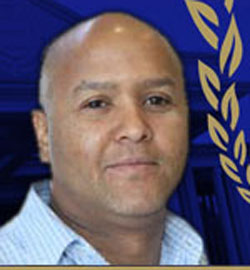Q & A with Dr Mervin Meyer
News category: Nanopeople
 UWC’s Dr Mervin Meyer is on the hunt for new biomarkers, molecular beacons to help develop diagnostic tests to identify breast and cervical cancer. A senior lecturer in the Department of Biotechnology, he is also the Director of the DST/Mintek Nanotechnology Innovation Centre-Biolabels Unit at UWC.
UWC’s Dr Mervin Meyer is on the hunt for new biomarkers, molecular beacons to help develop diagnostic tests to identify breast and cervical cancer. A senior lecturer in the Department of Biotechnology, he is also the Director of the DST/Mintek Nanotechnology Innovation Centre-Biolabels Unit at UWC.
What is the main focus of your research?
Biomarkers act like homing beacons that help us to track down whether someone has certain cancers. We use bioinformatics to help identify genes that encode serum proteins that can be used as biomarkers for the diagnosis of cancer and diabetes. Once we have confirmed the biomarkers using molecular techniques, we source biomolecules (antibodies and aptamers) that can recognise these proteins. These biomolecules are then used to develop assays for these biomarkers.
What role does nanotechnology or nanoscience play in your research?
Gold nanoparticles (colloidal gold) are used extensively for applications in diagnostics due to their unique optical properties. In addition, the large surface area-to-volume ratio of gold nanoparticles enables their surface to be coated with hundreds of small molecules (proteins, nucleic acids, polysaccharides, lipids, carbohydrates), which facilitates the development of alternative therapeutic approaches.
One of the hallmarks of cancer is that these cells are desensitised to programmed cell death (also known as apoptosis). Cancer cells do this by over expressing certain proteins that can inhibit cell death pathways. We also make use of cancer-targeting peptides to help direct drugs to the site, specifically drugs that can block or inhibit these proteins.
Describe any successes you have had in your research so far.
We identified several serum biomarkers for cervical and breast cancer. We are now in the process of confirming the presence of these biomarkers in cancer tissues. Once the biomarkers are validated we will develop lateral flow devices for the detection of these biomarkers.
What is the ultimate goal you are hoping for in your research?
To develop at least one commercial product based on this technology that can change the lives of South Africans.
Messages for students wishing to enter this field.
- Research can be extremely frustrating at times; however the gratifying feeling of achieving success compensates for the frustrations and makes it all worthwhile.
- Nanotechnology is a multi-disciplinary field and to be successful you must be willing to venture into other disciplines.
What was your career path to your present position?
A PhD in Biochemistry from the University of the Western Cape and four years of postdoctoral research, first at the National University of Ireland, and then back at UWC led to a Medical Research Council Career Award and my present position [where he supervises currently 17 Honours, Masters and PhD students]. My collaborators in this research include Prof Bongani Ndimba, Dr Abram Madiehe, Prof Eugenia D’Amato, Dr Ashley Pretorius, Dr Zainu Arief and Dr Martin Onani, all from UWC.
